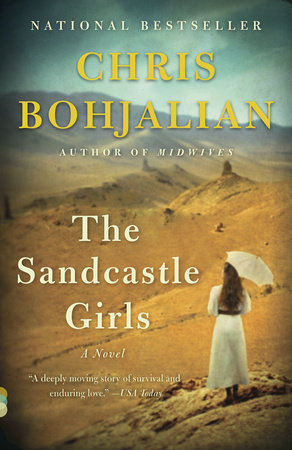Reading Group Center
- Home •
- Books by Category •
- Imprints •
- News •
- Videos •
- Media Center •
- Reading Group Center
Armchair Adventurer: Commemorating the Centenary of the Armenian Genocide
When Chris Bohjalian first set out to write The Sandcastle Girls, a remarkable love story unfolding against the terrifying backdrop of the Armenian genocide of 1915, he encountered skepticism regarding the subject matter. But as Bohjalian himself wrote in an essay for the Reading Group Center, “[the naysayers] dramatically underestimated the curiosity and desire to learn of a lot of North American readers.” Today, as we mark the centenary of the Armenian Genocide, learning about, recognizing, and remembering the human tragedy recounted within The Sandcastle Girls seems especially appropriate. In this edition of Armchair Adventurer, we explore the devastating historical events that gave the impetus for Bohjalian’s haunting novel.
In The Sandcastle Girls, wealthy young American Elizabeth Endicott arrives in Aleppo to aid refugees of the Armenian Genocide in 1915. And though she’s steeled herself for the tragedy that she’s to encounter, nothing can have prepared her for the horrifying sight of the emaciated Armenian deportees:
Approaching from down the street is a staggering column of old women, and she is surprised to observe they are African. She stares, transfixed…. These women are completely naked, bare from their feet to the long drapes of matted black hair. And it is the hair, long and straight though filthy and impossibly tangled, that causes her to understand that these women are white—at least they were once—and they are, in fact, not old at all. Many might be her age or even a little younger. All are beyond modesty, beyond caring. Their skin has been seared black by the sun or stained by the soil in which they have slept or, in some cases, by great yawning scabs and wounds that are open and festering and, even at this distance, malodorous…. Their breasts are lost to their ribs. The bones of their hips protrude like baskets.
Elizabeth bears witness to the abuse committed against these Armenian women, and through her eyes, we vicariously experience the overwhelming horror of the Armenian Genocide. Tracing one Armenian family’s history from 1915 to the present, Chris Bohjalian uncovers a story of love and loss, and illuminates a bigger tale of ethnic destruction—but also of resilience.
The women that Elizabeth sees being literally herded into Aleppo are a small fraction of the hundreds of thousands who were forced to leave their homes and to march across the Syrian desert, without clothes or provisions, therefore sentenced to an almost certain death. Those who lived were taken to camps to face further atrocities. Most deportees were women and children, as able-bodied men had been already been systematically massacred or subjected to forced labor—a measure meant to prevent armed resistance. The Sandcastle Girls’ Armen, the Armenian engineer whom Elizabeth falls in love with, survives the siege of his home city of Van, but loses his wife and infant daughter.
Although Armen is officially a Turkish citizen, being “an infidel” means, in his own words, “a second-class status in Turkey in this life and—so I am told—a pretty nasty experience in the next one.” Within the sprawling Islamic state, the Christian Armenians were among many religious minorities relatively autonomous under Ottoman rule but with limited rights as citizens. By the turn of the twentieth century, many of them had successfully broken from the declining empire. In the Russo-Turkish War of 1877–78 and Balkan Wars of 1912–13, the Ottoman Empire lost the majority of its European territories, a huge blow, which made retaining the empire’s eastern provinces, including ones populated by Armenians, a priority. And so, when the Ottoman army, fighting on the side of Germany in World War I, was defeated by its old enemy, Russia, in the battle of Sarikemish in 1914, the Ottoman Minister of War officially blamed the loss on the local Armenians, who he said had backed the Russian forces. He ordered the demobilization of the Armenian military units in the Ottoman army and launched a wholesale campaign against all ethnic Armenians.
A century ago today, about two hundred and fifty Armenian intellectuals were arrested and executed in Constantinople (modern Istanbul). This atrocity is considered the beginning of the systematic decimation of about 1.5 million Armenians. By writing The Sandcastle Girls, Chris Bohjalian, the grandson of Armenian survivors, has helped ensure that their story, and the story of those who survived horrible odds, lives on.


